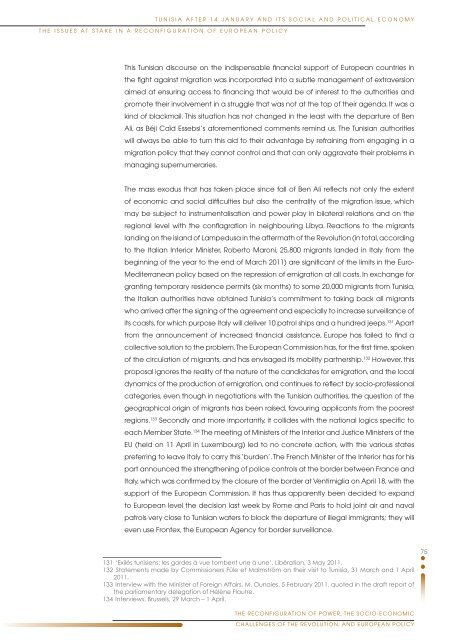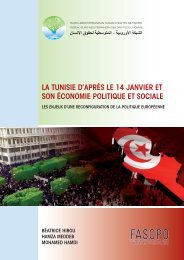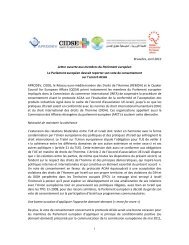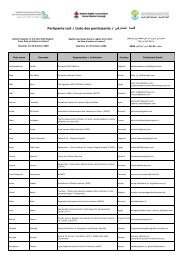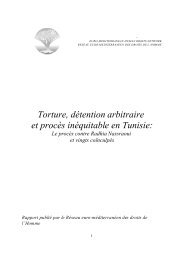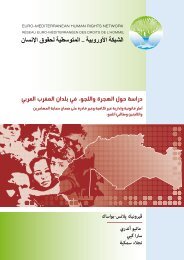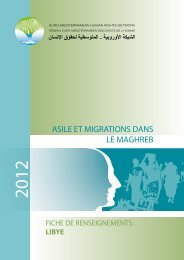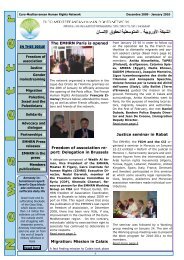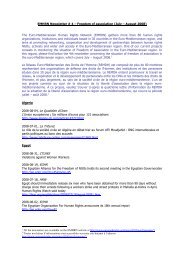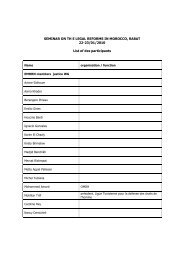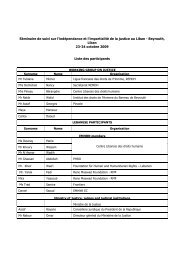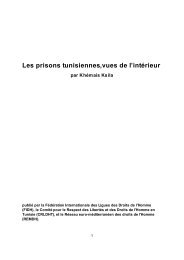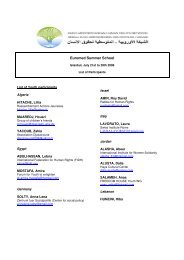tunisia after 14 january and its social and political economy - Refworld
tunisia after 14 january and its social and political economy - Refworld
tunisia after 14 january and its social and political economy - Refworld
Create successful ePaper yourself
Turn your PDF publications into a flip-book with our unique Google optimized e-Paper software.
T U N I S I A A F T E R 1 4 J A N U A R Y A N D I T S S O C I A L A N D P O L I T I C A L E C O N O M YT H E I S S U E S A T S T A K E I N A R E C O N F I G U R A T I O N O F E U R O P E A N P O L I C YThis Tunisian discourse on the indispensable financial support of European countries inthe fight against migration was incorporated into a subtle management of extraversionaimed at ensuring access to financing that would be of interest to the authorities <strong>and</strong>promote their involvement in a struggle that was not at the top of their agenda. It was akind of blackmail. This situation has not changed in the least with the departure of BenAli, as Béji Caïd Essebsi’s aforementioned comments remind us. The Tunisian authoritieswill always be able to turn this aid to their advantage by refraining from engaging in amigration policy that they cannot control <strong>and</strong> that can only aggravate their problems inmanaging supernumeraries.The mass exodus that has taken place since fall of Ben Ali reflects not only the extentof economic <strong>and</strong> <strong>social</strong> difficulties but also the centrality of the migration issue, whichmay be subject to instrumentalisation <strong>and</strong> power play in bilateral relations <strong>and</strong> on theregional level with the conflagration in neighbouring Libya. Reactions to the migrantsl<strong>and</strong>ing on the isl<strong>and</strong> of Lampedusa in the <strong>after</strong>math of the Revolution (in total, accordingto the Italian Interior Minister, Roberto Maroni, 25,800 migrants l<strong>and</strong>ed in Italy from thebeginning of the year to the end of March 2011) are significant of the lim<strong>its</strong> in the Euro-Mediterranean policy based on the repression of emigration at all costs. In exchange forgranting temporary residence perm<strong>its</strong> (six months) to some 20,000 migrants from Tunisia,the Italian authorities have obtained Tunisia’s commitment to taking back all migrantswho arrived <strong>after</strong> the signing of the agreement <strong>and</strong> especially to increase surveillance of<strong>its</strong> coasts, for which purpose Italy will deliver 10 patrol ships <strong>and</strong> a hundred jeeps. 131 Apartfrom the announcement of increased financial assistance, Europe has failed to find acollective solution to the problem. The European Commission has, for the first time, spokenof the circulation of migrants, <strong>and</strong> has envisaged <strong>its</strong> mobility partnership. 132 However, thisproposal ignores the reality of the nature of the c<strong>and</strong>idates for emigration, <strong>and</strong> the localdynamics of the production of emigration, <strong>and</strong> continues to reflect by socio-professionalcategories, even though in negotiations with the Tunisian authorities, the question of thegeographical origin of migrants has been raised, favouring applicants from the poorestregions. 133 Secondly <strong>and</strong> more importantly, it collides with the national logics specific toeach Member State. 134 The meeting of Ministers of the Interior <strong>and</strong> Justice Ministers of theEU (held on 11 April in Luxembourg) led to no concrete action, with the various statespreferring to leave Italy to carry this ‘burden’. The French Minister of the Interior has for hispart announced the strengthening of police controls at the border between France <strong>and</strong>Italy, which was confirmed by the closure of the border at Ventimiglia on April 18, with thesupport of the European Commission. It has thus apparently been decided to exp<strong>and</strong>to European level the decision last week by Rome <strong>and</strong> Paris to hold joint air <strong>and</strong> navalpatrols very close to Tunisian waters to block the departure of illegal immigrants; they willeven use Frontex, the European Agency for border surveillance.131 ‘Exilés tunisiens: les gardes à vue tombent une à une’, Libération, 3 May 2011.132 Statements made by Commissioners Füle et Malmström on their visit to Tunisia, 31 March <strong>and</strong> 1 April2011.133 Interview with the Minister of Foreign Affairs, M. Ounaies, 5 February 2011, quoted in the draft report ofthe parliamentary delegation of Hélène Flautre.134 Interviews, Brussels, 29 March – 1 April.75The reconfiguration of power, the socio-economicchallenges of the revolution, <strong>and</strong> European policy


